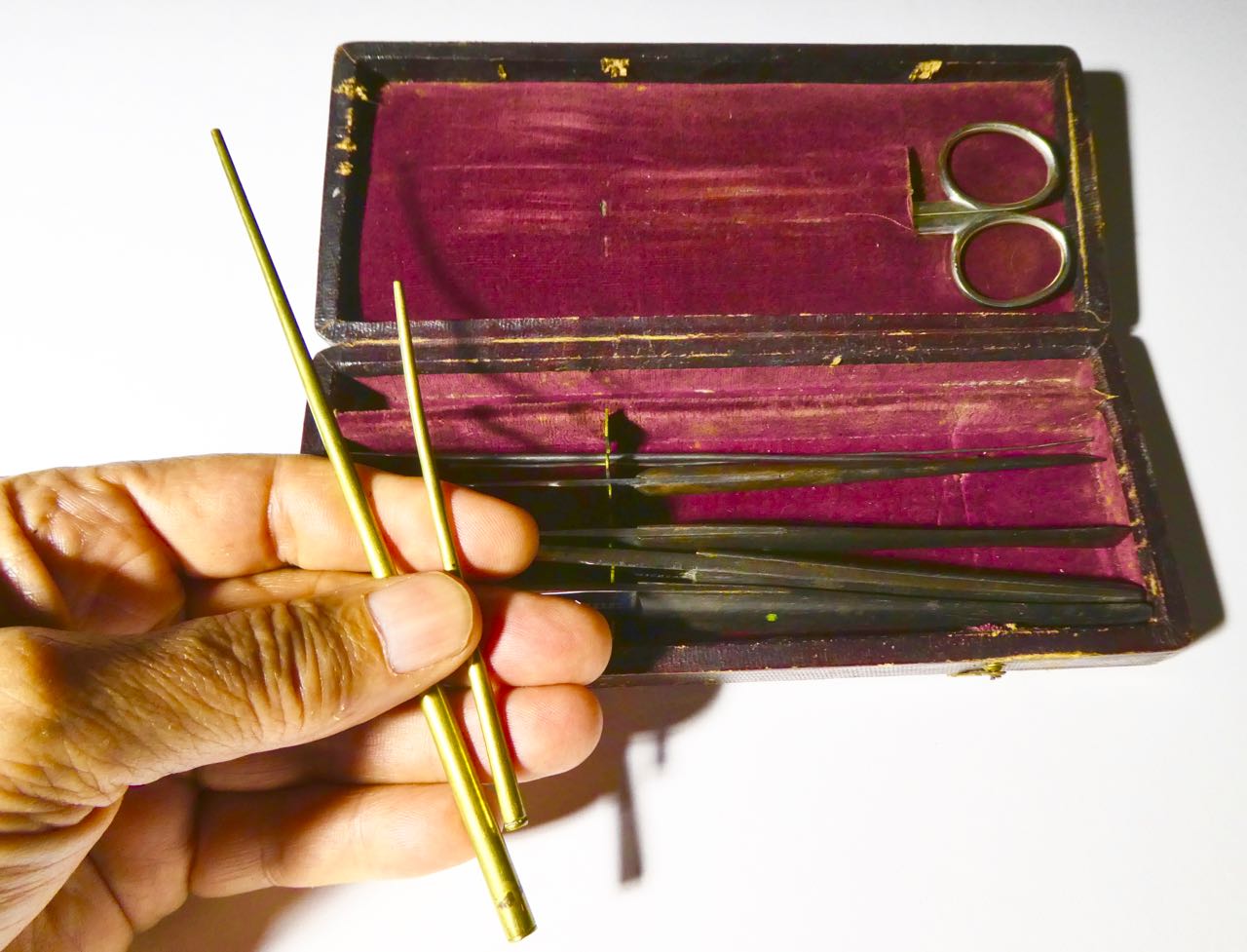Surgery |
||
Dissection box (1) |
||
From 1875 on, the University of Tübingen made its dissection courses obligatory:
About the manufacturer "His Majesty the King, on the 27th of March, gave the instrument maker Joseph Wickert in Munich the gracious title of a university instrument maker", says the Governmental Gazette of the Kingdom of Bavaria 1827 p.256).
The undersigned hereby gives the honor to announce that he has left his former apartment in the Sonnenstrasse and moved into his new quarters in the Kanal-Bellstrasse, HV House-Nro 1284 Lit. B.
On this occasion he recommended himself to pleasing ones Orders in all types of surgical instruments, as well as in bandages and machines, also to other mechanical work.He also razor of the highest quality, as well as to order, all types of table and dessert knives are made, he flatters a complacent Zuspruchs, and assures prompt service and the cheapest prices Munich, May 10, 1829 Joseph Wickert, manufacturer of surgical instruments at the Ludwig Maximilian University of Munich "(Der Bayerische Landbote, 16.5.1829 S.497).
According to the information of the royal court doctor Dr. Wenzel, the royal instrument manufacturer Wickert dahier has manufactured and simplified the Civiale instrument for crumbling the bladder stones in a manner which is the most common use for this important operation Mr. Wickert, therefore, in agreement with the Royal Court and Surgeon Dr. Wenzel, has obtained a most gracious certificate from the Royal Government.The advantages of this instrument before the Civiale are: 1) very easy introduction, without preparation, and 2) quite safe handling in the urinary bladder, 3) the possibility of starting the operation at the same time, without removing the instrument, at the first examination for diseased bladder stones, 4) possibility of injections into the bladder without taking the instrument out, 5) by half simplified apparatus at 6) comparatively low cost of 4 to 5 louis d'or the Civiale instrument in Paris costs between 1000 and 1200 francs, in Germany between 25 and 30 louis d'or "(Beylage to the Allgemeine deutsche Zeitung für Russland, 5.1.1829).
Apparently, WICKERT also developed an osteotome that was later modified: "Carl Nood, Alterations to the Osteotome by Mr. Wickert, University Instrument Maker in Munich, Munich 1836".
In 1840 he exhibited in Nuremberg and was showered with praise "WINKLER in Munich and HAMMON in Nuremberg are distinguished by the quality of the material and the meticulousness of the work, especially with regard to sanding and polishing." As late as 1845, Wickert was a member of the Polytechnic Association of Bavaria (Kunst- und Gewerbeblatt of the Polytechnic Association for the Kingdom of Bavaria, Munich 1845). When the business went well, he expanded: "Wickert Joseph, a university instrument maker, also has a large publishing house in the Kaufingerstr.3" (Universal Manual of Munich 1845 p.308).
Similar cutlery "Complete anatomical cutlery requires 1 cartilage knife, 4-6 single- and double-edged secirmite of various sizes, one or a pair of scissors, a pincette, a bone saw, a tubule, a hook, multiple probes, staples, etc." (Johann Friedrich Pierer, Anatomical-physiological real dictionary, Leipzig 1816 p. 239).
In the catalog of the Medicinische Waarenhaus A.-G. Berlin, printed around 1910, we find on page 314 an "Anatomical cutlery, model Kaiser Wilhelm Academy, containing: 1 incision scissors, 1 cartilage knife with scraper, 1 nerve meter, 2 large scalpels, 2 medium scalpels, 2 tweezers, 1 double tubulus, 3 probes, 1 climbing hook, 3 needles, 2 chisels ". We are particularly interested in the "double tubule", which also appears in our WICKERT cutlery. What was he for? In the book "The Conservator" by August Vollrath Streubel (Berlin 1845) we find in the paragraph on anatomical cutlery the statement: "a tubule with a tap to inflate caves and canals".
In the (actual!) Catalog of the company Fred Mattes we do not only find "tubuli" on offer, but also the suitable English translation: "blow pipes" ...
Exponat Besteckkasten von Joseph Wickert, erworben als "Chirurgisches Besteck" auf dem Flohmarkt von Völs 4/2017.
|




